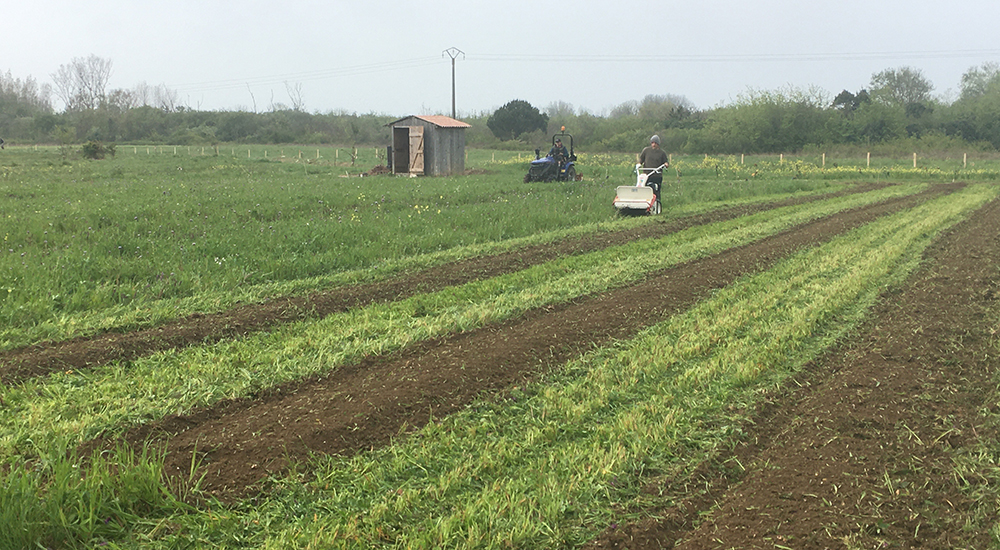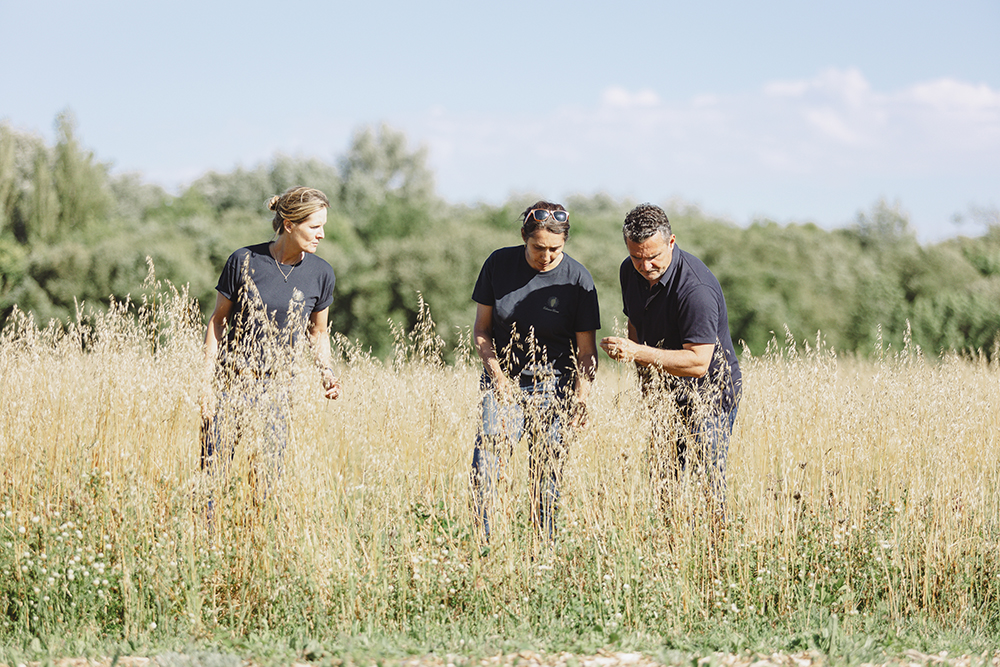Organic garden and eco-responsible brand: the challenges facing Melifera
Two years ago, we decided to develop an organic garden, further establishing Melifera as an eco-responsible brand.
But what does it mean to us to be an eco-responsible brand?
What’s the point of growing our immortals and other aromatic plants in an organic garden? How does this project make sense to us, and in concrete terms, what are we doing about it and what do we want it to become?
It’s this day-to-day commitment, what it involves and the course we’ve set ourselves, that we want to talk to you about in this article.

View of the Melifera garden plantings from the entrance
Why create an organic garden, essential or not for an eco-responsible brand?
The creation of our Organic Garden is intended to be the voice of our eco-responsible brand. It may not be essential, but it’s a decision that’s an integral part of our project for Melifera.
For the record, our first immortals were planted at the very start of the adventure on a market garden. Organic farmers in the north of the island put their trust in us. When they left, we bought back the land where the immortals needed to make our Gin were planted and recruited Ethel Gauthier, our biodiversity and sustainable production manager.
The Melifera garden has many aims:
- The aim of this organic garden is to spread the word and raise our customers’ awareness of good agricultural and socio-economic practices.
- It is farmland and a production site for the aromatic plants used in our Gin.
- We want to create a real reservoir of biodiversity in this area.
- Finally, we want to create a community, a movement of people who are convinced that it is possible to reconcile consumption with respect for the environment.
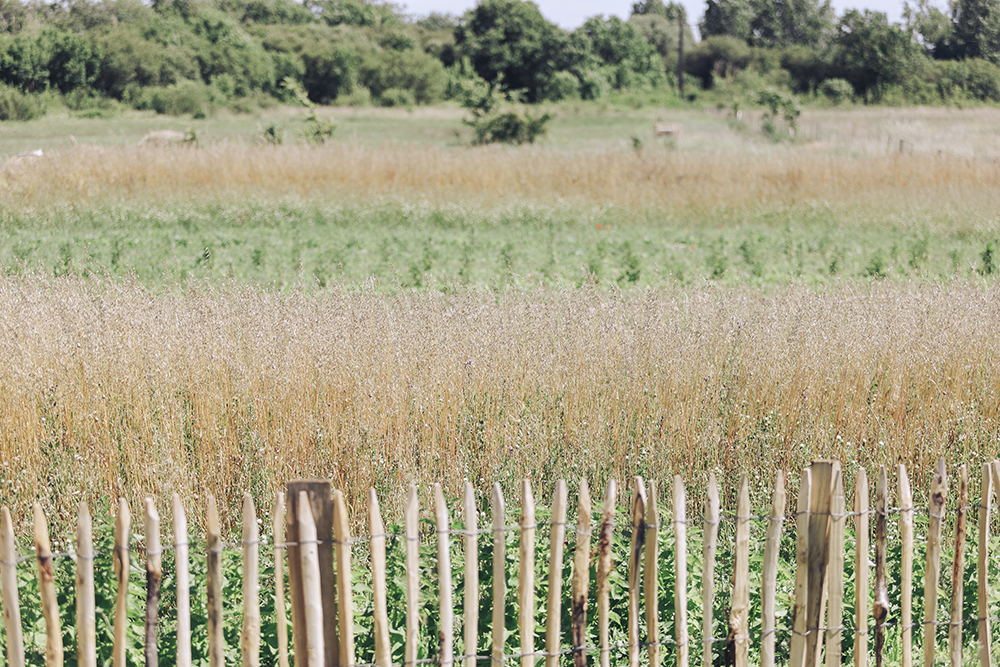
Overview of the Melifera garden in summer.©Miguel Ramos
This organic garden project highlights the 3 values of our eco-responsible brand
The three main values underpinning this organic garden and the Melifera brand are :
- Agro-ecology and respect for living organisms: While creating an organic Gin is important to us, working our land according to the principles of agroecology is even more so. Agroecology can be defined as virtuous agriculture that serves biodiversity. It’s a set of practices designed to restore the soil’s natural fertility processes by relying on the presence of living soil organisms. In the current context of climate change, where meteorological episodes (drought, heavy rain, storms, etc.) will become more intense and more frequent, we are convinced that this is the best way forward.
- Protecting biodiversity, in particular through our collaboration with the Conservatoire de l’abeille Noire (Black Bee Conservatory) in Oléron, and beyond that, through the practices implemented in the garden.
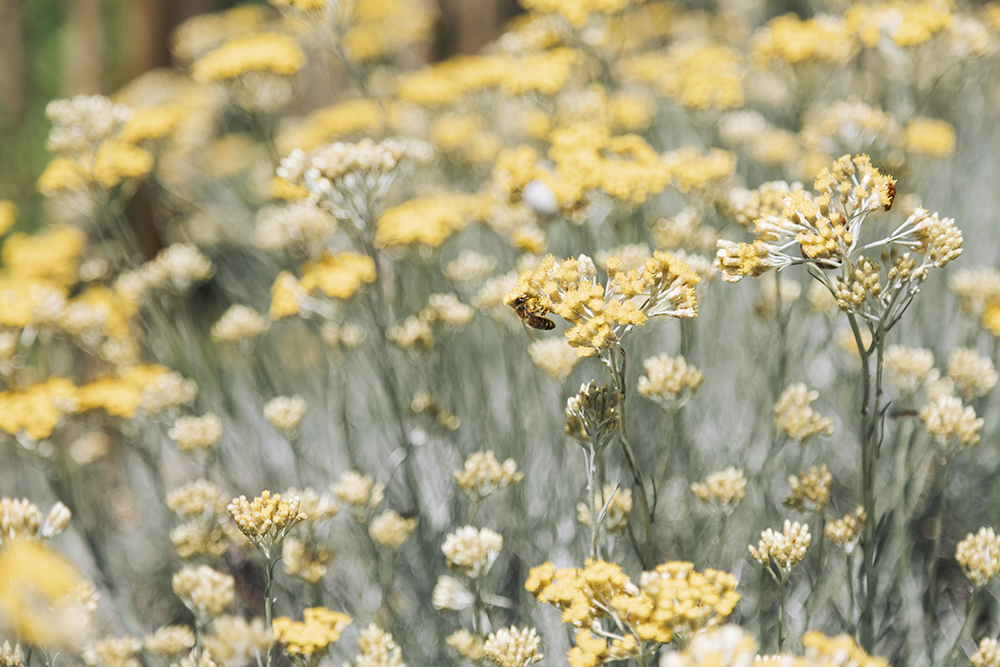
A black bee foraging on our immortelle plants, which are highly melliferous.© Miguel Ramos
- Going local: We are committed to respecting the area where Melifera is based, and to participating in the development of the island of Oléron. We take care to establish solid relationships with local partners. As a result, all the work carried out since last autumn has been done in collaboration with teams of landscapers from Marennes and our neighbouring farming partners.
How does the recent work on our organic garden establish Melifera as an eco-responsible brand?
The work carried out on our organic garden makes us an eco-responsible brand,
- because we have created an area that encourages the development of biodiversity, guaranteed pesticide-free,
- because the planting has been chosen and carried out with respect for living things,
- because they give pride of place to a permanent meadow, a key element in agro-ecology.
The organic garden means creating a space that encourages biodiversity
All the work undertaken in our organic garden is systematically designed to allow the site’s biodiversity to flourish. Here are a few illustrations of the decisions we have taken to become an eco-responsible brand, and their objectives:
- Welcoming and preserving wildlife. We have fenced off the periphery of the site to make it easier for us to welcome animals for eco-pasture. The mesh size and height of the fencing was carefully chosen to keep wild boar out while allowing small wildlife to pass through.
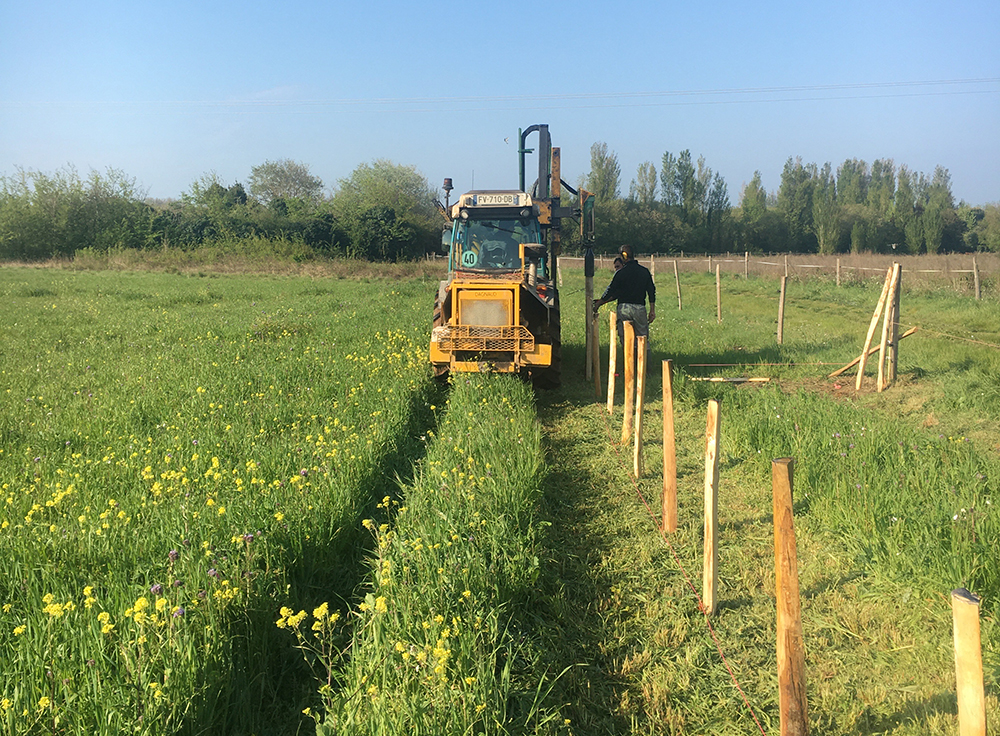
Installation of chestnut posts and sheep netting.
- Increasing soil fertility by encouraging biodiversity in the soil. The decision to sow a plant cover crop last autumn is part of this eco-responsible approach, stimulating biodiversity. We respect the principle that living soil is soil that is always covered. So our space is always either “vegetated” (aromatic plants, plant cover, meadows and tall grasses), or covered with mulch (straw, fragmented wood, mulch, etc.). In this way, we ensure that the soil always has organic matter to feed the bacteria that make it work. Voluntarily leaving this cover on the uncultivated areas throughout the summer nourishes the soil, protects it from erosion and conserves moisture. The cover crop was shredded in the autumn to add matter to the soil and then re-densified by direct seeding, so that it can flourish again next spring.
- Recreating biodiversity in the garden
The more diverse the layout of an area, the more welcoming it will be for a rich array of plant and animal species. The greater the diversity of living organisms, both flora and fauna, the more we will encourage a living environment in which ecological balances are naturally established between pests and beneficial organisms. Reasonable mowing, the creation of a permanent meadow, and the introduction of features such as rural hedges, bird nesting boxes and perches for birds of prey planned for this winter, as well as stony areas, are all steps in this direction.
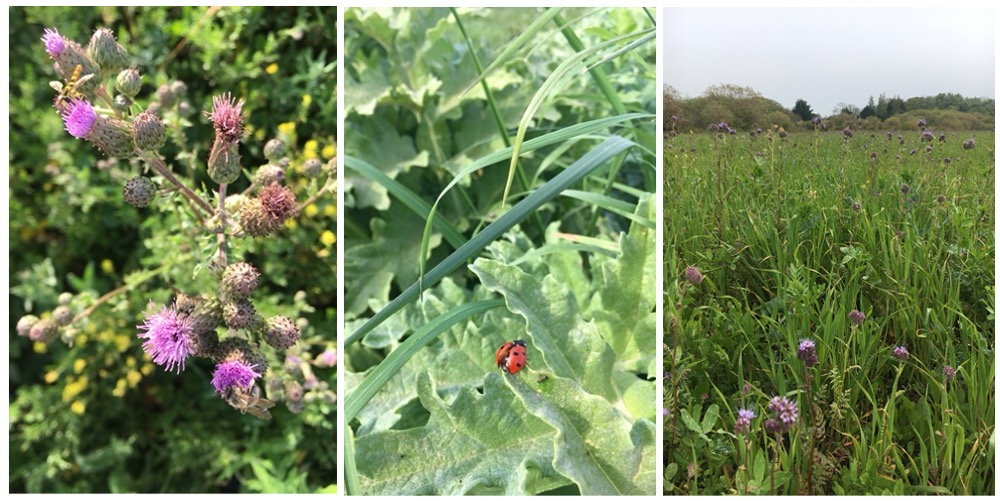
Biodiversity (hoverflies and ladybirds) can be seen among the plants / phacelia in bloom in the plant cover (which also includes vetch, clover, daikon radish and oats).
- Encouraging domestic and wild pollinators
The establishment of the black bee apiary in partnership with Emmanuel Ratier, our favourite beekeeper, was very important to us. The choice of botanicals selected for the garden is also a step in the same direction: we try to encourage diversity in our cultivated plants. Most of the time, these plants are of interest to mellifers and encourage the presence of pollinating and beneficial insects. We have planted around fifteen perennial or bi-annual flowering plants, representing almost a dozen botanical families (Asteraceae, Apiaceae, etc.). The meadowsweet, for example, is known for its melliferous properties and pollen load, attracting pollinators.
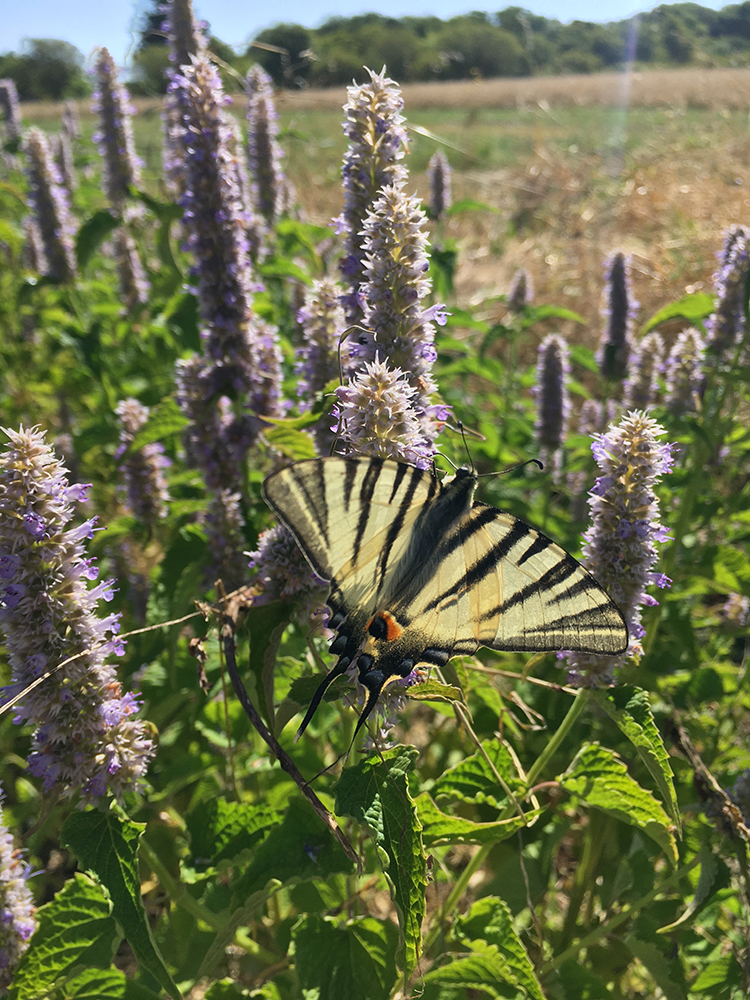
©Les fleurs d’ Agastache fenouil ( Agastache foeniculum) Machaon (Papilio machaon)
Comfrey and fennel agastache are also plants with a high nectar potential, whose flowers are systematically visited by bumblebees, bees, hoverflies, butterflies and other pollinators.
The site is also home to various tree species and numerous wildflowers (brambles, thistles, orchids, St John’s wort, etc.) of interest to pollinators.
Creating an organic garden also means planting crops that respect our eco-responsible brand.
- At Jardin Melifera, we work by hand every day to maintain and harvest our crops. For agricultural work, when it is necessary, we only work the soil at the surface level and take care to use, as far as possible, the lightest possible agricultural equipment to limit soil compaction, which could hinder the circulation of water and air in the soil. Limiting tillage, like soil cover, is one of the key factors in enhancing soil fertility. The less we disturb our soil, the more living organisms will be able to thrive in it (microfauna, macrofauna, micro-organisms and fungi). When preparing the beds, you should therefore mark out the areas that will never be trodden on.
©Creation of crop beds and shredding of the inter-row canopy
- The perfume, aromatic and medicinal plants (PAM) were planted by hand with the teams. All the plants grown are certified organic and come from Nathalie Novak’s nursery near Poitiers. We planted almost 1,800 plants, including 700 new immortelle plants! We did the planting by hand, with a different planting density for each variety. The inter-rows were left grassed.
- The method of irrigation chosen for our plants is also designed to save this resource. Drip irrigation allows us to manage water consumption economically, to bring water to the base of the plants and to adapt watering to the specific needs of each plant. The pipe, like the rest of the bed, is covered with mulch to limit water evaporation. After the first few months, the crops planted, mostly perennials, should require very little watering.
- The choice of botanicals has also been carefully thought out: of edible and/or medicinal interest, our flowering plants also have other properties that make them an asset to the garden (melliferous interest, making natural purin, companion plant, etc.). They are also adapted to the environment and characteristics of our soil (biotope). Borage, for example, sown as a cover plant at the entrance to the site with other wild plants, attracts many pollinators. It’s a good idea to plant it near crops that need pollinating. Mugwort and wormwood are effective insect, rodent, snail and slug repellents. They are also host plants for aphid control agents.

Planting MAP in spring
- NB: the “pollinator” cover sown in the landscaped area at the entrance to the site has the “Végétal local” label (Supplier: Semence nature), which certifies that the wild and local plants have been collected in the natural environment, that they have not been selected or crossed by man and that they are naturally present in the region of origin in question, in this case the South-West. The value of combining a number of local plants with crops is of ecosystem importance. As well as feeding insects, these flowers encourage the presence of all the avifauna that feed on them.
As part of our commitment to being an eco-responsible brand, our organic garden includes a permanent meadow, a pillar of agroecology.
In our organic garden, in addition to our farming practices, we are keen to enrich the ecosystem by respecting the pillars of agro-ecology through the restoration of a permanent meadow.
Formerly fallow land or partly cultivated for market gardening, our aim is to preserve an area of natural grassland, i.e. with a diverse and spontaneous flora, which has not been turned over or reseeded. Even if they are described as natural, it is man’s work that maintains these meadows in their current state, through mowing or grazing.
If left untended, these agrosystems become overgrown and develop into woodland. Maintaining a permanent meadow is ambitious, but it’s the ideal to aim for, especially as we also have other environments that are just as complementary to the cultivated area, such as an area on the edge of a wood bordered by a forest that is home to a gentle marsh, as well as the surrounding fallow areas. Our partners, the donkeys of Oléron, help us a great deal in this ambition, by grazing their sheep, goats and other Poitou donkeys.

Permanent grassland managed as ecopasture with the Anes d’Oléron team
In the same way that we limit tillage so as not to destroy the organisms present, we take care to limit mowing and leave the grass tall, providing both shelter for biodiversity and protection for the soil. Combined with the hedges and trees that we plan to plant in the near future, the unmown areas provide a variety of habitats where a wide range of animals (insects, birds, mammals) can take refuge, feed and reproduce, all of which are invaluable in the food chain and contribute to the natural balance of the garden.
Meadows also play an important role in the water cycle by encouraging infiltration and limiting run-off. In summer, they have a major air-catching effect. Tall grasses act as dew nets, preventing the sun’s rays from hitting the ground. There will be more fungi in the soil, and the soil’s capacity not to evaporate too much will be increased.
These commitments are essential for preserving biodiversity, but they are also crucial for enriching the soil and helping plants to adapt to climate change. Planting cover crops is an interesting way of storing carbon in the soil and helping to limit CO2 emissions into the atmosphere and the resulting global warming. Grasslands with a low grazing density have a greater capacity to absorb carbon and accumulate it in the soil, thanks to the natural process of photosynthesis.
How does Jardin Bio Melifera fit into the future of the Melifera brand?
In order to create this organic garden and establish ourselves as an eco-responsible brand, we have read a lot, researched a lot and benefit from Ethel’s experience, who knows how to surround herself with invaluable partners.

Ethel, our biodiversity and sustainable supply chain officer, looking after the Fennel Agastache.
Because of its size, small production volumes and the quality of the site, the Jardin Melifera is a magnificent testing ground for the agro-ecological approach to cultivation and site management. We need to learn to grow plants that will indirectly sustain soil life by contributing biomass and a root system. We need to reintroduce hedges and trees into the fields, along the lines of agroforestry, for the same reason.
Through good farming practices, we can ensure that biodiversity is preserved and provide ecosystem services to society.
These respectful practices also have a particular meaning in the context of climate change.
Let’s not forget that plants are our best allies in the fight against global warming when they absorb CO2, the main greenhouse gas, and store it within themselves and in the soil. Forests, peat bogs and other grasslands form immense natural carbon reservoirs, veritable barriers against global warming.
But there are no ready-made recipes, and each technique tried out must be understood in its own context, with its own successes and failures. That’s what makes the agro-ecological approach so complex, but also so interesting and in line with our deep-rooted values linked to nature! Sharing experiences with other producers is also fundamental and stimulating for overcoming difficulties.
Our wish is to create a space that could eventually be replicated in other places, or even other countries. While the principles need to be adapted by each individual to their own constraints, agro-ecology is a process that can be undertaken by everyone and for all types of production.
And why not dream that the ideas of the Jardin Melifera will spread…
As a place to visit and a spokesperson for the values of our eco-responsible brand, as well as being a production area, this organic garden is destined to grow.
Our plantations will grow and surely expand, even tending towards self-sufficiency, but we will always hold dear the principles and balance required by agroecology.
Cécile-Julie, Ethel and Christophe in the garden ©Miguel Ramos

